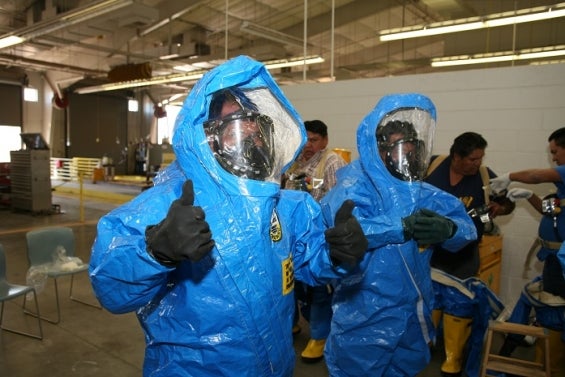Headline News
Training Courses For Teamster Rail Members Handling Hazardous Materials

Rail members who handle or are responsible for the safe transport of hazardous materials are required to make certain that they are up to date on the current procedures for safe handling of these materials. Over the past 20 years, the shipment, by rail, of crude oil, ethanol, chlorine, ammonia, fertilizer and other toxic or flammable materials has grown tremendously. Although the increased rail traffic has meant an increase in the number of locomotive engineers, trainmen and maintenance of way employes working on the rails and in rail yards, this has also meant an increase in our members’ potential exposure to deadly chemicals.
The Teamsters Safety and Health Department now administers OSHA and DOT training classes through funding grants provided by the National Institute of Environmental Health Sciences (NIEHS) and the Department of Transportation (DOT). Previously, the rail program grant funds were coordinated by the National Labor College in Silver Spring, Md. However, that facility closed in 2013.
Since the Teamsters Safety and Health Department began administering the funds for the training, the types of classes were increased and the schedule for the 2014-2015 year has just been announced.
“Uncontrolled releases of chemicals can be extremely dangerous, especially in transportation,” said Henry Jujaga, the manager for the training program based in Houston, TX. “Emergency responders are particularly at risk. Any worker who is likely to witness or discover a hazardous materials spill or release is considered a first responder and must be trained. And of course, workers involved in the clean-up or post-emergency response activities of a hazardous materials incident are considered emergency responders and required to be trained by the employer.”
If you are a Brotherhood of Locomotive Engineers and Trainmen (BLET) or Brotherhood of Maintenance of Way Employes (BMWED) member, and would like to take part in any of the classes, please follow this link to obtain more information: http://www.rwhmtp.org/Training.asp
Praise for HazMat Training
“The courses enlightened me on the dangers that we face every day hauling hazardous materials,” said Oscar B., BLET.
“Many railroad workers do not view themselves as first responders to a derailment or crossing accident. Being around the firefighters and cadets (as part of the training) makes you stop and think how critical those first few moments can be after an accident,” said Brian A., BLET.
“I think the information in the hazmat courses is extremely helpful to me as a locomotive engineer, co-worker and Coordinator of the BLET-Safety Task Force. The information we learned at the recent class will help keep us informed of the dangers of hazardous materials in a future incident,” said Carl W. Fields, BLET.